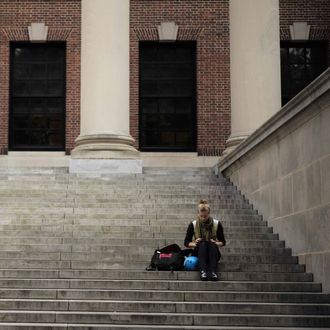
Harvard University, like most elite private colleges, has basically become an academia-themed investment firm. By ushering so many of our nation’s best (or most privileged) young minds into highly lucrative professions — and then convincing those alumni to give their surplus millions to the university instead of somewhere desperately needy — Harvard has built up a $37.6 billion endowment.
Now a slate of candidates for the school’s Board of Overseers is calling for the school to draw on that immense bank account’s earnings and make Harvard the first tuition-free Ivy League school. Oh, and end affirmative action.
The group was assembled by Ron Unz, a conservative California software entrepreneur. Before he began pushing to establish free higher education, Unz sponsored ballot initiatives to ban bilingual education, the New York Times reports. Unz, along with three of the other candidates, have all voiced fierce opposition to affirmative action. The fifth person on their slate is Ralph Nader.
Unifying the slate’s two planks, which are summed up in the slogan “Free Harvard, Fair Harvard,” is a commitment to a certain vision of meritocracy. Unz argues that Harvard presently fails to field the best possible student body, because brilliant low-income students are scared off by the school’s $45,000 published tuition — and because the school discriminates against better-qualified Asian-American students to achieve its goals for racial diversity. That latter charge is the basis of an ongoing federal lawsuit against the university.
Even if the slate wins a place on Harvard’s second-most-powerful board, they will have a hard time getting the school to spend the money. Although the 30-member Board of Overseers has veto power over many of the university’s strategic plans, the school’s smaller, supreme governing body, the President and Fellows of Harvard College, has more power to propose new ones.
“There is a common misconception that endowments, including Harvard’s, can be accessed like bank accounts, used for anything at any time as long as funds are available,” Jeff Neal, a Harvard spokesman, told the Times. “In reality, Harvard’s flexibility in spending from the endowment is limited by the fact that it must be maintained in perpetuity and that it is largely restricted by the explicit wishes of those who contributed the endowed funds.”
For Unz & Co. to convince Harvard to test the “flexibility” of its endowment spending, they’ll probably need some help from Congress.
Republican New York congressman Tom Reed has pushed a proposal that would require the 90 colleges with endowments of over $1 billion to spend roughly 25 percent of their annual earnings for tuition assistance — or else forfeit the tax exemption they presently enjoy on those earnings.
According to the Congressional Research Service, college endowments held $516 billion in 2014. The average annual return on those endowments was 15.5 percent, only 4.4 percent of which was spent on the actual academic institutions behind those funds.
Reed told the Times that, at a school as wealthy and investment-savvy as Harvard, his law “would essentially wipe out any tuition bill that a child would be responsible for.”
Meanwhile, the only free private college in America, Cooper Union, gave up the ghost in 2013 and started charging tuition for the first time in 150 years. Its board is reportedly groping its way toward a plan to return to the full-scholarship-for-all model.






























